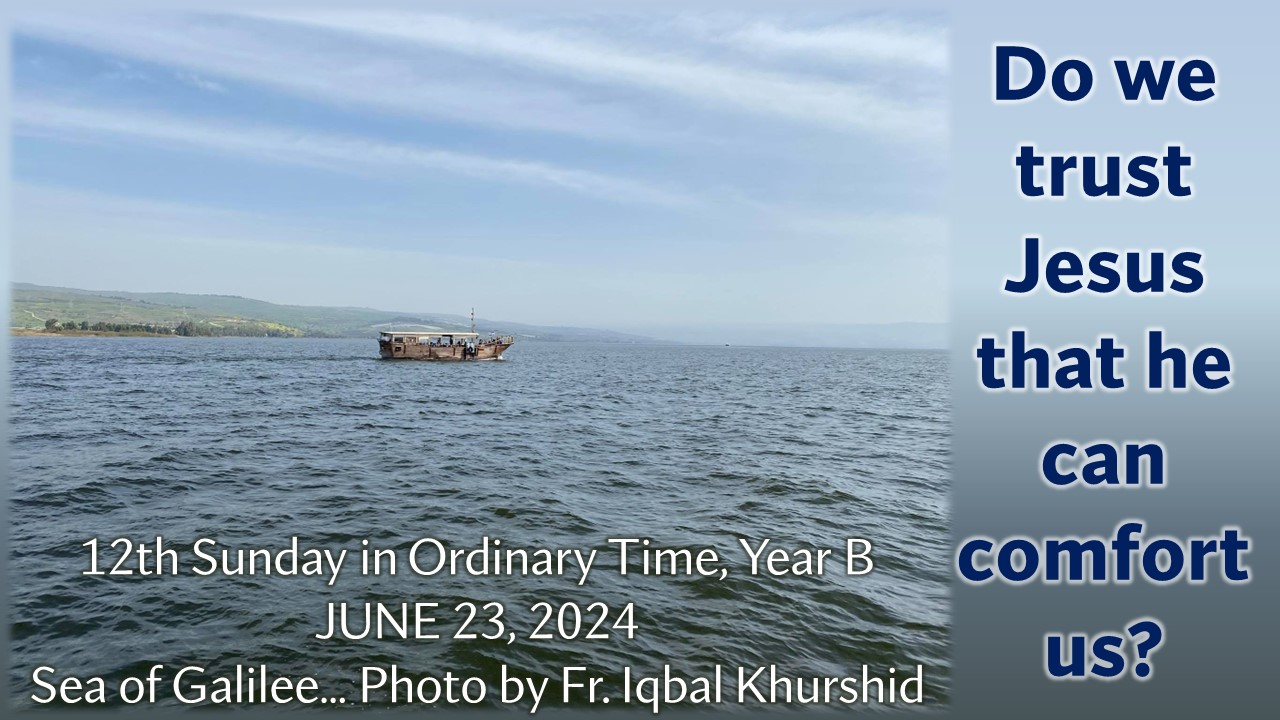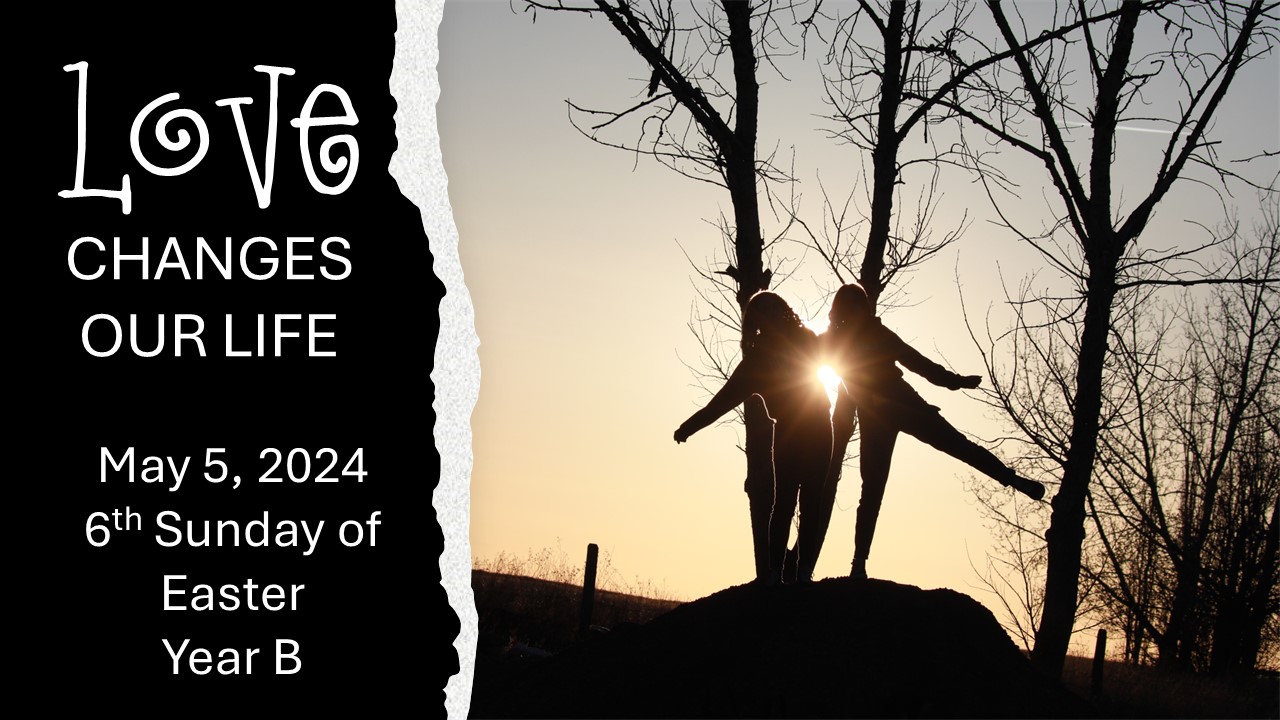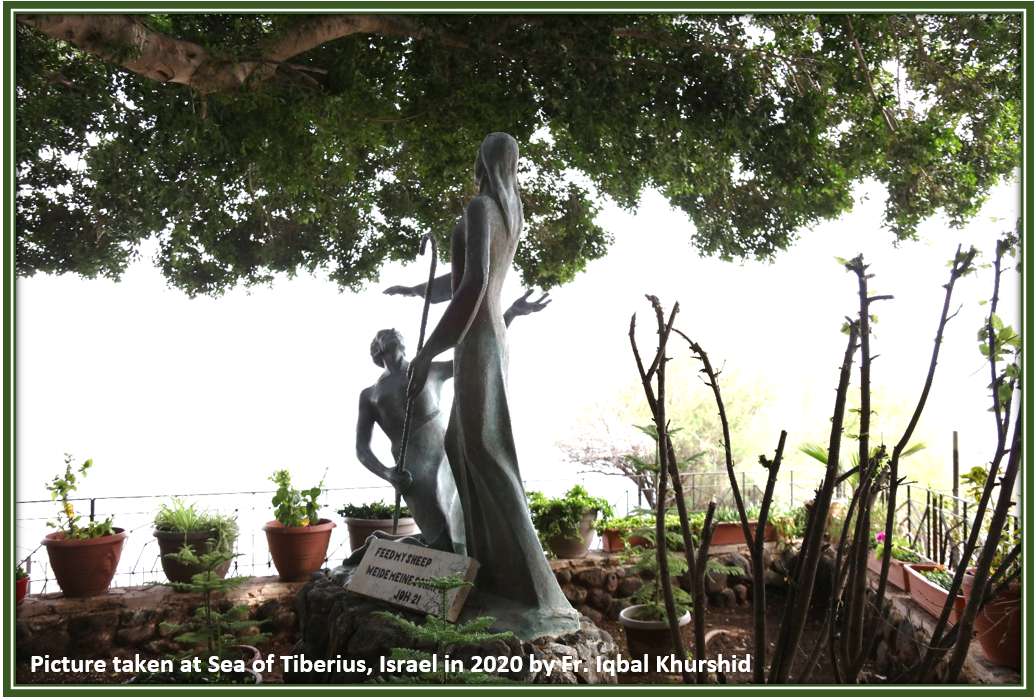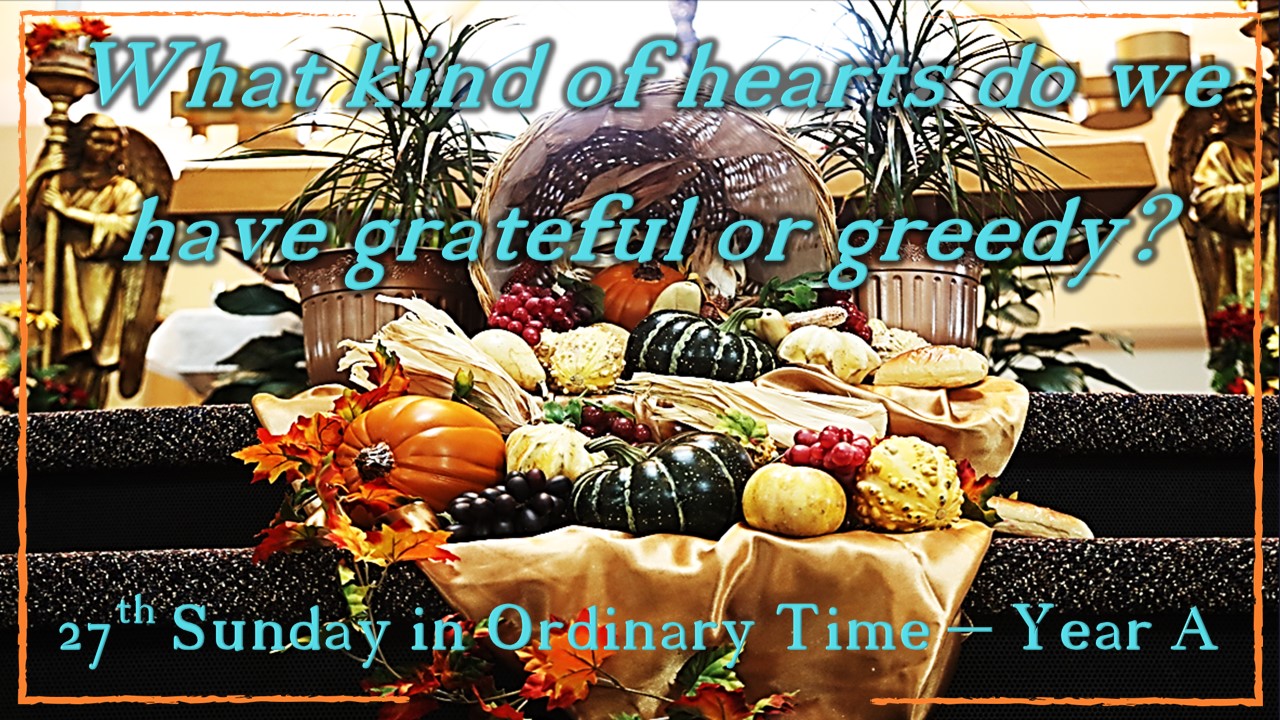
12th Sunday in Ordinary Time, Year B ~ June 23, 2024
12th Sunday in Ordinary Time, Year B JUNE 23, 2024
HE COMFORTS US
As we continue our faith journey, the Sacred Scripture Readings this week are reminding us that God is all powerful and he comforts us in the storms of life we face. He is omnipotent who has created the universe out of nothing because “he says, and it happens”.
A young tree faced many storms through its young life. The powerful winds, torrential rains, famine, ice, and snow would lie across its branches. At times the young tree questioned its maker asking, “Why have you let so many storms come into my life?” His maker whispered, “You will understand one day, stand firm, you will make it through the storms of life.” “The challenges will pass, keep this in mind.”
The tree questioned his master, “If I go through one more winter the snow will surely break my branches if I face any more powerful wind I will surely be uprooted and moved away.” His maker whispered, “Stand strong, dig your roots deep into the soil, you will understand someday.” Somehow the young tree kept the positive thoughts in his mind and managed to survive and make it through even the toughest of storms.
Somehow, even in the toughest of times, when the things it went through should have broken it down, it found a way to stand firm even through the worst of storms.
As a young tree grew taller, stronger, and matured the tree realized the storms of life had made it stronger. How many of you have faced with adversity in your life?
Have you been faced with hard economic times, sickness, death, or other trials in your life? How well were you able to cope with the challenges that you were facing at the time? How well were you able to the weather the storm in life that you were in?
Did anyone ever share motivational stories with you that inspired you to weather on through the personal storms even though the times were rough and wearisome?
Most people going through challenges in life won’t realize that there is something to be learned from the experience. If this big problem can be prevented from ever happening again, then be aware of its causes. Perhaps, better solutions can also be considered just in case a new challenge presents itself in the future. After every storm, pick up the pieces, mend the broken parts, and move on. The storms in our lives shouldn’t make you frightened or weak. Instead, look at storms in your life as something that can make you a stronger and a better person. Life is not about waiting for the storms to pass… It’s about learning how to dance in the rain. A bend in the road is not the end of the road… unless you fail to make the turn.
In life, things happen around us, things happen to us, but the only thing that truly matters is how do we choose to react to it and what we make out of it. Life is not a piece of cake to enjoy all the time neither it is the bed of roses to rest but a constant struggle to face the storms of our life.
As we begin the Sunday readings of Ordinary time, after the solemnities of the Most Holy Trinity and Corpus Christi, we begin to reflect on who God is for each of us. What do we think of God? How have we experienced God in our lives? How many times have we experienced storms in our lives and thought that the Lord was asleep, that God was not concerned, that God was simply ignoring us? The world tells us there is no God because God was there then these things shouldn’t happen and we happily accept it. Life is full of storms. At times, they can become so strong and strange that our human strength can no longer support us. At such moments fear and complains might take over the central stage of our life. Even in some cases, we might lose our faith in God, thinking that he has abandoned us or that he does not exist. These storms come in different forms. They could be problems in our marriage, our children who are not responding well, lack of good job, poor finance, inability to procreate, or a prolonged sickness that has defiled all treatments. They could also be the inability to find or maintain a good and stable relationship or falling out with people all the time. They could also be poor results in our academics or business. The list is unending, but these represent the realities we face every day. The truth is that there is no assurance that our lives would be completely free of storms. But the Gospel today lets us know that God is always aware of what is happening in our lives, even when He seems asleep, unconcerned and uncaring. The Gospel invites us to a deep level of trust in our God. God loves us and cares for us always and will not let us perish. We don’t always understand the ways of God—and that should never surprise us. God sees all and knows all, and our vision and knowledge is so restricted! St. Peter says, “cast your care on to him, for he cares for you” and Prophet Isaiah says, “Surely he has borne our infirmities and carried our diseases; yet we accounted him stricken, struck down by God, and afflicted” (53:4).
A man and his teenage daughter were driving home after a day out together. The daughter was learning to drive at the time and needed practice, so asked her father if she could drive. Being a supportive an encouraging man, he said, ‘Absolutely.’ They stopped the car, swapped seats and the daughter started driving. The father was very impressed by what an attentive and competent driver his daughter was. After a short time driving, big black clouds started rolling in and they could both see a storm coming. The daughter started to get a little concerned and asked her father whether they should pull over and wait for the storm to pass. The father looked at her and said, ‘No, we’ll be fine, keep driving.’ So, with his confidence in her, she kept driving.
Soon, the wind started blowing and the rain started falling and it was getting quite heavy. The girl, started to get scared said, ‘Dad, I think I should pull over and wait for the storm to pass.’ But again, the father said, ‘No darling, just keep driving through the storm.’ She trusted her father and God, so she kept going. It didn’t take long before the storm really started to reach its full force. There was thunder, lightning and the rain was pelting against the windscreen, making it difficult to see even just a few feet ahead. All the other cars on the road were pulling over and stopping. The terrified girl again asked her father, ‘Shouldn’t we stop? All the other cars are. It’s hard to see and I’m scared.’ The father, in the same calm and relaxed fashion, said again, ‘No, keep driving through the storm.’
Very soon they were through the storm. The rain stopped, the wind eased, and the sun started to break through the clouds. The girl was visibly shaken, but relieved and proud of herself, as she looked at her father, smiling. After regaining her composure, she asked, ‘Why did we keep driving through the storm dad, when stopping seemed to be the safer thing to do?’ The father requested that she stop the car at that point. They pulled over, got out of the car, looked back along the road they had just travelled, and the storm they had just come through, and he asked the girl, ‘Where are all the people who stopped?’ She looked quizzically, shrugged her shoulders and said, back there somewhere, in the storm.’ ‘Yes,’ her father replied, ‘they stopped and so they are still in the storm and will be stuck there longer. We kept driving and we made it out the other side.’
There are two powerful messages in this inspiring story. The first is to keep moving when you are dealing with a storm in your life. Don’t; stop, give-up, have a tantrum, start blaming, go into victim-mode or believe you aren’t good enough. Keep moving forward one step at a time, taking positive action and soon you will be through the storm in your life, whatever it may be. The second message is one I believe may be even more powerful. If the girl didn’t have her father by her side encouraging her to keep going, what would she have done? She would have stopped in the storm and been stuck in it for longer, right?
We all are aware about the story of Job that though he was a righteous man on earth, but he suffered and lost everything. Everyone came to tell him to speak against God and die including his wife and friends, but he trusted in the Lord, and he was blessed with everything in twofold. During the storms of our life, we experience the darkness of fear, hopelessness, brokenness, stress, depression, and suffering. And Holy Father Pope Francis reflection on the Gospel says, “When evening had come” (Mk 4:35). The Gospel passage we have just heard begins like this. We find ourselves afraid and lost. Like the disciples in the Gospel, we were caught off guard by an unexpected, turbulent storm. We have realized that we are in the same boat, all of us fragile and disoriented, but at the same time important and needed, all of us called to row together, each of us in need of comforting the other. On this boat… are all of us. Just like those disciples, who spoke anxiously with one voice, saying “We are perishing”, so we too have realized that we cannot go on thinking of ourselves, but only together can we do this”.
There are two basic truths that the gospel reveals to us about these problems. The First is that Christ is with us in that boat and, is aware of the storm we are battling with. So, we cannot be with Him and yet sink. It is not possible! The second is that no matter how experienced we think we are in navigating our own boat, we cannot overcome our storms alone. Hence, Christ tells us: “Apart from me, you can do nothing.” There is no doubt that before inviting Christ, his disciples made much effort to control their own boat. However, when they failed, they cried out: “Lord, do you not care if we perish?” Of course, Christ intervened because he assured us: “Call upon me in times of trouble and I will help you” (Ps 50: 15).
Whenever we fail in action and feel depressed, we should not forget about God because he helps us “I have heard the cry of my people and have come down to save them” However we need to open our hearts to include him in our all means to deal the storms of our life as just in the following story we read.
A professor stood before his philosophy class and had some items in front of him. When the class began, he wordlessly picked up a very large and empty mayonnaise jar and proceeded to fill it with golf balls. He then asked the students if the jar was full. They agreed that it was. The professor then picked up a box of pebbles and poured them into the jar. He shook the jar lightly. The pebbles rolled into the open areas between the golf balls. He then asked the students again if the jar was full. They agreed it was. The professor next picked up a box of sand and poured it into the jar. Of course, the sand filled up everything else. He asked once more if the jar was full. The students responded with a unanimous ‘yes.’ The professor then produced two Beers from under the table and poured the entire contents into the jar effectively filling the empty space between the sand. The students laughed. ‘Now,’ said the professor as the laughter subsided, ‘I want you to recognize that this jar represents your life. The golf balls are the important things—your family, your children, your health, your friends and your favorite passions—and if everything else was lost and only they remained, your life would still be full. The pebbles are the other things that matter like your job, your house and your car. The sand is everything else—the small stuff. ‘If you put the sand into the jar first,’ he continued, ‘there is no room for the pebbles or the golf balls. The same goes for life. If you spend all your time and energy on the small stuff you will never have room for the things that are important to you. Pay attention to the things that are critical to your happiness. Spend time with your children. Spend time with your parents. Visit with grandparents. Set your priorities. The rest is just sand!
There are three things we must continue to do. First, rather than live in fear, sit and complain like Job, or give up completely, let us cry out and invite the Lord to help us. This is because: “Our help comes from the Lord who made heaven and earth” (Ps 121, 1-2). Second, we must continue to show profound faith in God, his Son Jesus Christ, and in the Holy Spirit. That is, faith that makes us believe that God created us in love sustains us with his providence and will save us through his mercy. Third, we must continue to be thankful to God in all circumstances of our life. So, with the psalmist let us: “…Give thanks to the Lord, for his love and mercy endures forever.”
It is easy to recognize ourselves in this story. What is harder to understand is Jesus’ attitude. While his disciples are quite naturally alarmed and desperate, he stands in the stern, in the part of the boat that sinks first. And what does he do? Despite the tempest, he sleeps on soundly, trusting in the Father; this is the only time in the Gospels we see Jesus sleeping. When he wakes up, after calming the wind and the waters, he turns to the disciples in a reproaching voice: “Why are you afraid? Have you no faith?”.
Let us try to understand. In what does the lack of the disciples’ faith consist, as contrasted with Jesus’ trust? They had not stopped believing in him; in fact, they called on him. But we see how they call on him: “Teacher, do you not care if we perish?”. Do you not care? They think that Jesus is not interested in them, does not care about them. One of the things that hurts us and our families most when we hear it said is: “Do you not care about me?” It is a phrase that wounds and unleashes storms in our hearts. It would have shaken Jesus too. Because he, more than anyone, cares about us. Indeed, once they have called on Him, He saves His disciples from their discouragement.
Holy Father says the storm exposes our vulnerability and uncovers those false and superfluous certainties around which we have constructed our daily schedules, our projects, our habits and priorities. It shows us how we have allowed to become dull and feeble the very things that nourish, sustain and strengthen our lives and our communities. The tempest lays bare all our pre-packaged ideas and forgetfulness of what nourishes our people’s souls; all those attempts that anesthetize us with ways of thinking and acting that supposedly “save” us, but instead prove incapable of putting us in touch with our roots and keeping alive the memory of those who have gone before us. We deprive ourselves of the antibodies we need to confront adversity”.
The Lord asks us and, amid our tempest, invites us to reawaken and put into practice that solidarity and hope capable of giving strength, support and meaning to these hours when everything seems to be floundering. The Lord awakens to reawaken and revive our Easter faith. We have an anchor: by his cross we have been saved. We have a rudder: by his cross we have been redeemed. We have a hope: by his cross we have been healed and embraced so that nothing and no one can separate us from his redeeming love. Let us once again listen to the proclamation that saves us: he is risen and is living by our side. The Lord asks us from his cross to rediscover the life that awaits us, to look towards those who look to us, to strengthen, recognize and foster the grace that lives within us. Let us not quench the wavering flame (Is 42:3) that never falters and let us allow hope to be rekindled.
Embracing his cross means finding the courage to embrace all the hardships of the present time, abandoning for a moment our eagerness for power and possessions to make room for the creativity that only the Spirit is capable of inspiring. It means finding the courage to create spaces where everyone can recognize that they are called, and to allow new forms of hospitality, fraternity and solidarity. By his cross we have been saved to embrace hope and let it strengthen and sustain all measures and all possible avenues for helping us protect ourselves and others. Embracing the Lord to embrace hope: that is the strength of faith, which frees us from fear and gives us hope. St. Peter says, “cast all our anxieties onto him, for he cares about us” (1 Pet 5:7).
He stands with us to make our lives easy, but we need to call on him and trust in him who keep saying to us “come to be all that weary and carrying have burden and I will give you rest”
Do we trust Jesus that he can comfort us?
Other Sermons In This Series

6th Sunday of EASTER – YEAR B ~ MAY 5, 2024
May 02, 2024

3rd Sunday of Easter Year C ~ Sunday, May 1, 2022
April 29, 2022

27th Sunday in Ordinary Time – Year A ~ October 8, 2023
October 06, 2023

